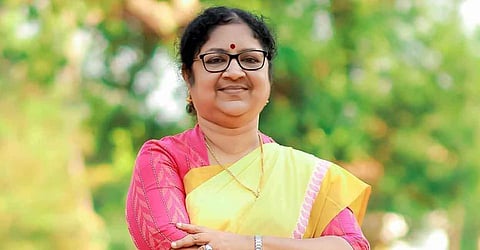

A few decades ago, as an 18-year-old, Dr R Bindu was a member of the University of Calicut's syndicate. This was the first time that she got a hang of how things work in the Higher Education sector in India. She recalls debating and discussing the plans of privatisation in education, introduced by the then Prime Minister Rajiv Gandhi. After that, there was no turning back. A few years later, she came back to work in the same sector, as an English professor in a college under the same university, where she taught for 26 years. At that time, she was also a member of the Higher Education Council's advisory board.
In 2021, this Communist party veteran won her first assembly election, to take oath as Kerala's new Minister for Collegiate Education, Technical Education, Universities, Entrance Examinations, National Cadet Corps, Additional Skill Acquisition Programme, and Social Justice. Bindu is excited about her portfolio for she knows that this is one sector that she knows inside out and where can make a lot of constructive changes. "It is a field that I know well and I am aware of the issues here," she tells us. There is a lot more that she told us in a conversation that she made time for, in between a long road trip.
Excerpts:
Despite faring well in school education, Kerala's Higher Education institutions rarely bag good ranks in the National Institutions Ranking Framework. Why is this?
Kerala has always concentrated on the universalisation of education and provided access to all groups compared to other states, which provided access to only elite classes. However, we couldn't make a lot of qualitative changes in our education system. A change is indispensable. Currently, our goal is the betterment of all Higher Education institutions in the country, so that all of them score above 3.5 in the NAAC ranking. At the same time, one must note that our colleges have representation of all classes and are inclusive.
What are the changes that we are looking at?
The rules and statutes of our universities have to be updated. These were made years ago. Even though they were apt at that time, they have become quite outdated. The Higher Education sector plays a pivotal role in making ours a 'knowledge society'. The nature and content of the courses must be changed. Also, skilling should be given priority. Other than that, interdisciplinary courses and new generation studies that address the demand of the 21st century must be introduced.
When will the universities reopen? Will students be vaccinated on priority?
We do not know when the universities will reopen. And to vaccinate, vaccines should be available. The government's priority is to vaccinate the elderly first.
You spoke about how the Rajiv Gandhi government introduced privatisation. The NEP faces the same criticism from left circles. How have things transformed over years?
The NEP closes all scopes for social justice. The unified syllabus and the fee structures that it mentions keeps children from the middle-class out of the education system. During Gandhi's time, privatisation's seeds were sown. But it wasn't this bad. even though the Indian universities at that time were considered as experimentation labs of globalisation. Rajiv Gandhi introduced these concepts, NEP strengthened it and made education a commodity.
What are your issues with the NEP?
The NEP doesn't mention secularism, which is a constitutional value and this was the first educational document that doesn't specify it. Casteist and communalist feelings are getting developed over years in Indian academia. In the last few years, a lot of communal people were appointed to key posts.
Could you talk a little about your time in the JNU?
I was a student of the Jawaharlal Nehru University from 1990 to 1994. I had to leave my PhD and come to Kerala because I got a job. The environment there was very liberal and it helped me shape my worldview. We had a lot of debates and discussions there and there was representation from people from all Indian states.
